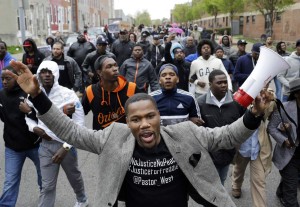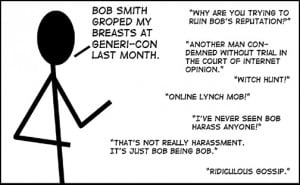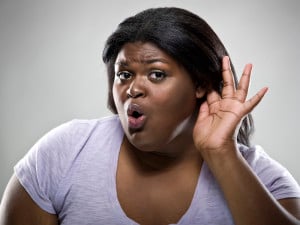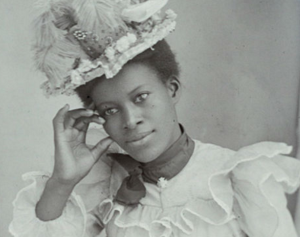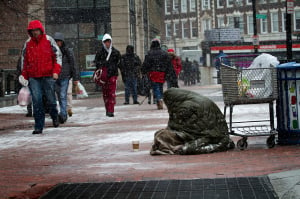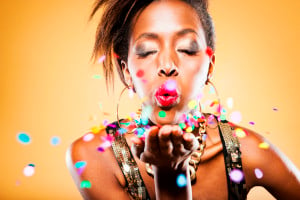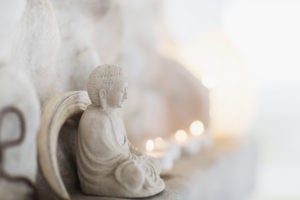As I reflect upon the most recent Baltimore Uprising taking place in the wider movement for racial justice in the United States, I can’t help but be simultaneously frustrated and inspired by the White people in my life.
I’m inspired by White friends and mentors who are striving for accountable solidarity to Black people within the #BlackLivesMatter movement, and I am constantly taking notes about how I can do more to advance the cause of racial justice through my own work, words, and activism.
But I’m also frustrated and disappointed in how so many of us are choosing to direct as much energy as possible to blaming people of Color for their own oppression and to condemning them for expressions of grief and rage that make us uncomfortable and afraid.
So as I reflect on those simultaneous feelings, I wanted to reach out through the medium of my writing, one White person to another, in hopes of inspiring us to think and engage more critically as people of Color literally fight for their lives.
1. As White People, We Are Not Victims of Racial Oppression
There is not a statistical measure that exists by which White people are oppressed while people of Color are privileged.
As such, we get zero say in how people who are oppressed respond to their oppression.
There is vast dialogue and debate within Black communities and other communities of Color about the most effective ways to realize justice, and in none of those conversations should the voices or leadership we White people who benefit from systems of racial oppression be centered.
2. A Movement of Nonviolence Has Been Occurring – We Just Weren’t Paying Attention
So many of us call on oppressed people to act nonviolently when they are being brutalized by violent police, institutions, and systems, but people of Color have been in the streets nonviolently for years calling for an end to racist police violence.
Where were we?
Yes, many White folks have shown up and shown out in solidarity, but by and large, we White people have been silent.
It’s entirely possible for us to believe in the transformative power of nonviolent revolution without patronizingly telling Black people how they should express their anger and rage that comes from being murdered in the streets by police.
It pains me to see anger, hurt, frustration, and pain boil over into the throwing of stones and destruction of property, but we need to remember the source of this pain: systemic racism expressed through police violence.
We simply have no right to tell a community that lives with the brutalization of White supremacy daily how they should direct or express their rage.
3. The Destruction of Property Pales in Comparison to the Destruction of Lives
Why is it that we as White folks seem to be ten times more outraged by the destruction of property than by the fact that police kill Black, Indigenous, and Latinx people every 19 hours in 2015
Why are we ten times more outraged by the setting of fires than by the racist, capitalist systems that produce the poverty that devastates communities of Color?
We can say all we like that we are “feeling for the small business owners and individuals who lost their property,” but every one of those broken windows can be replaced and every burnt building can be rebuilt.
The lives of people taken by police and consumed by our systems’ endless appetites for Black, Brown, and Indigenous suffering can never be returned.
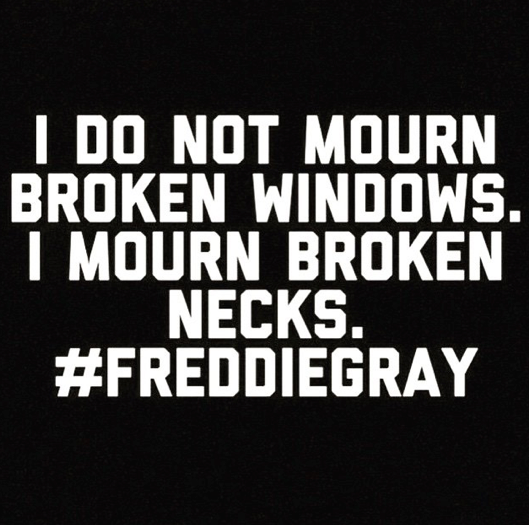
I DO NOT MOURN BROKEN WINDOWS. I MOURN BROKEN NECKS. #FREDDIEGRAY. Source: David Ellington Wright
4. Dr. King Wasn’t Here for Us – And He Still Isn’t
Rev. Dr. Martin Luther King, Jr. is not a cudgel for White people to use against Black people who respond to their oppression in ways that we do not find palatable.
The Rev. Dr. King was a radical revolutionary who called for a complete overturning of the racist, capitalist system in which we live. We do not get to coopt and distort his legacy or that of any civil rights leaders to maintain the status quo.
We would do well to actually read the writings of Dr. King (rather than cherry pick the quotes that support our agenda) and consider his words for White moderates:
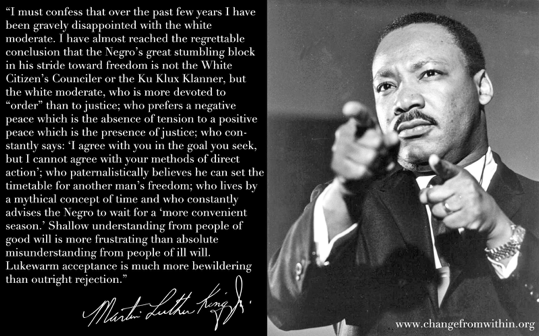
“I must confess that over the past few years I have been gravely disappointed with the white moderate. I have almost reached the regrettable conclusion that the Negro’s great stumbling block in his stride toward freedom is not the White Citizen’s Counciler or the Ku Klux Klanner, but the white moderate, who is more devoted to “order” than to justice; who prefers a negative peace which is the absence of tension to a positive peace which is the presence of justice; who constantly says: “I agree with you in the goal you seek, but I cannot agree with your methods of direct action”; who paternalistically believes he can set the timetable for another man’s freedom; who lives by a mythical concept of time and who constantly advises the Negro to wait for a “more convenient season.” Shallow understanding from people of good will is more frustrating than absolute misunderstanding from people of ill will. Lukewarm acceptance is much more bewildering than outright rejection.” Martin Luther King, Jr.
5. Stop (Seriously, Stop) with #AllLivesMatter
When we say #AllLivesMatter, we are participating in the erasure of the lives who sadly do not matter within our systems of oppression while injecting our own need to be centered into a movement for racial justice.
#BlackLivesMatter is a revolutionary call for change in systems where Black lives, cultures, and communities are devalued.
Here are a few links that explain this better than I ever could:
“What You Mean By #AllLivesMatter” by Arielle Newton of Black Millennials
“Please Stop Telling Me That All Lives Matter” by Julia Craven at Huffington Post
“What’s Wrong with ‘All Lives Matter?’” by George Yancy and Judith Butler at The New York Times
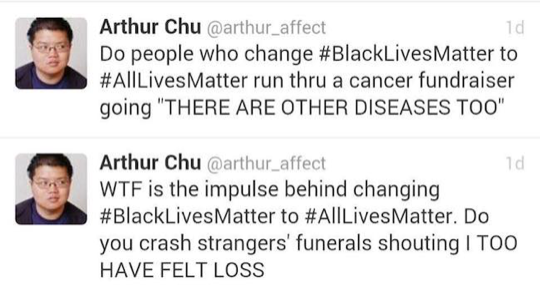
Tweets from Arthur Chu @arthur_affect: “Do people who change #BlackLivesMatter to #AllLivesMatter run thru a cancer fundraiser going “THERE ARE OTHER DISEASES TOO” “WTF is the impulse behind changing #BlackLivesMatter to #AllLivesMatter. Do you crash strangers’ funerals shouting I TOO HAVE FELT LOSS”
6. Having a Black President Doesn’t Absolve Us of Racism
It’s racist and tokenizing to point out individual Black people in positions of power while ignoring the vast oppression that impacts the lives of Black people in an attempt to prove that racism is over.
Citing that “we have a Black president” while ignoring the ways that Black people and other people of Color suffer in racist education systems, “justice” systems, healthcare systems, and economic systems is disingenuous at best and downright racist at worst.
The existence of individual Black politicians or a Black police chief or a Black mayor doesn’t undo the daily oppression Black people experience in our systems, particularly when Black elected officials often must tow the lines of racist oppression to stay in office.
7. Silence Is Violence
No matter how wonderful our intentions or how good we may be in our daily lives, if we are silent in the face racial injustice, we are complicit in its violence.
Worse, when we actively try to police the actions of those people of Color who are fighting for their freedom, we are committing subtle yet clear acts of racial violence.
8. ‘Being a Race Traitor’ Isn’t a Thing – It’s Called Humanity
To stand against the systems of oppression that afford us privilege does not inherently mean self-hate or White guilt.
To stand against injustice means that we are choosing to get in touch with our own humanity and to divest from systems of Whiteness while working in our own flawed and complicated ways to invest in justice and in anti-racist ways of being in the world as White people.
9. Instead of Investing in Whiteness, Invest in the Movement
If we are willing to listen, show up, and follow the Black, Brown, and Indigenous leadership of this movement, we can find incredible community filled with great love, accountability, and loyalty.
Whiteness attempts to isolate us, to make us invest in our access to oppressive systems rather than in community and people.
But there are alternatives to investing in Whiteness, and one of the most important alternatives is the community found in building trust across difference while fighting for justice under diverse leadership.
10. Use Your Time and Energy to Call in Other White People
Our voice, energy, and labor is needed in calling in White people – our people – to change.
In doing so, we must act in ways that are accountable to people of Color and that draw upon the history of White resistance to white supremacy.
***
If we are simply going to defend the status quo, then we need to sit down and be quiet.
But if we are going to work with our people to inspire more White folks to accountably work for justice, then our role is clear.
And it is our responsibility to rise into that role and to speak out for justice.
[do_widget id=”text-101″]
Jamie Utt is a Contributing Writer for Everyday Feminism. He is the Founder and Director of Education at CivilSchools, a comprehensive bullying prevention program, a diversity and inclusion consultant, and sexual violence prevention educator based in Tucson, AZ. He is currently working toward his PhD in Teaching, Learning, and Sociocultural Studies at the University of Arizona with research interests in the role that White teacher’s racial identity plays in their teaching practice. Learn more about his work at his website here and follow him on Twitter @utt_jamie. Read his articles here and book him for speaking engagements.
Search our 3000+ articles!
Read our articles about:
Our online racial justice training
Used by hundreds of universities, non-profits, and businesses.
Click to learn more


